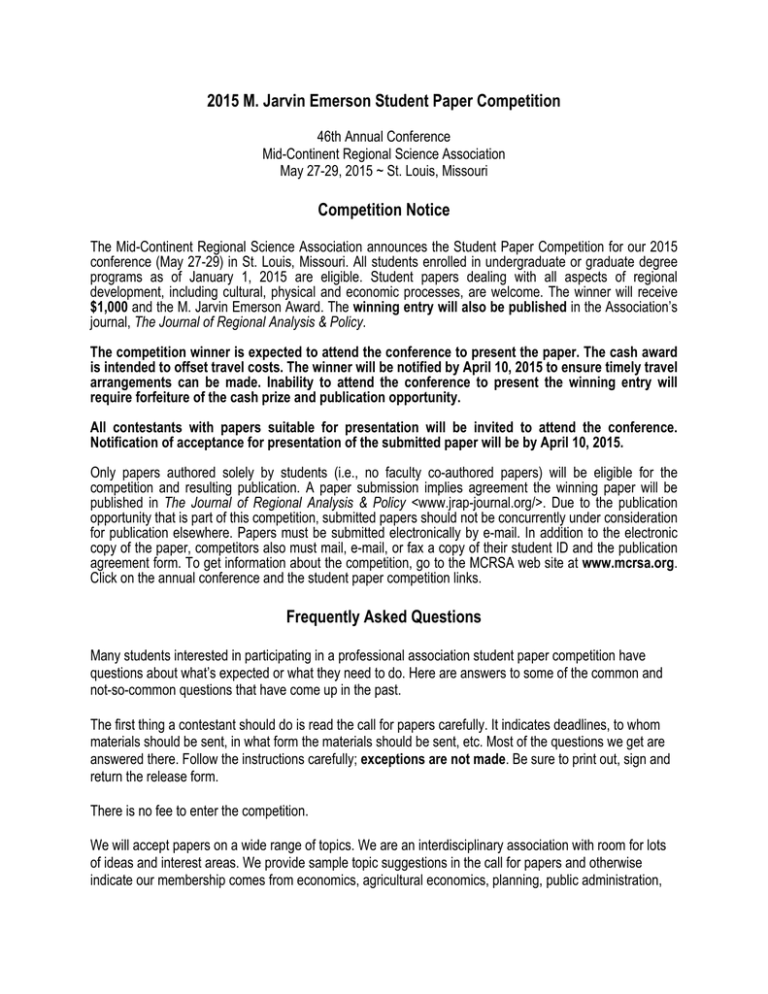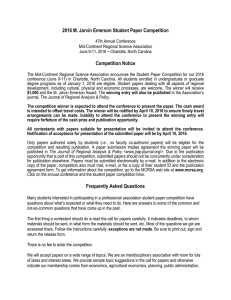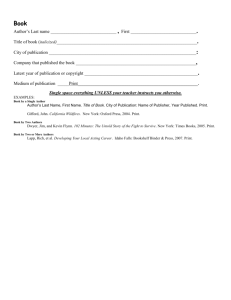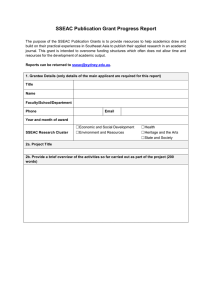2015 M. Jarvin Emerson Student Paper Competition Competition
advertisement

2015 M. Jarvin Emerson Student Paper Competition 46th Annual Conference Mid-Continent Regional Science Association May 27-29, 2015 ~ St. Louis, Missouri Competition Notice The Mid-Continent Regional Science Association announces the Student Paper Competition for our 2015 conference (May 27-29) in St. Louis, Missouri. All students enrolled in undergraduate or graduate degree programs as of January 1, 2015 are eligible. Student papers dealing with all aspects of regional development, including cultural, physical and economic processes, are welcome. The winner will receive $1,000 and the M. Jarvin Emerson Award. The winning entry will also be published in the Association’s journal, The Journal of Regional Analysis & Policy. The competition winner is expected to attend the conference to present the paper. The cash award is intended to offset travel costs. The winner will be notified by April 10, 2015 to ensure timely travel arrangements can be made. Inability to attend the conference to present the winning entry will require forfeiture of the cash prize and publication opportunity. All contestants with papers suitable for presentation will be invited to attend the conference. Notification of acceptance for presentation of the submitted paper will be by April 10, 2015. Only papers authored solely by students (i.e., no faculty co-authored papers) will be eligible for the competition and resulting publication. A paper submission implies agreement the winning paper will be published in The Journal of Regional Analysis & Policy <www.jrap-journal.org/>. Due to the publication opportunity that is part of this competition, submitted papers should not be concurrently under consideration for publication elsewhere. Papers must be submitted electronically by e-mail. In addition to the electronic copy of the paper, competitors also must mail, e-mail, or fax a copy of their student ID and the publication agreement form. To get information about the competition, go to the MCRSA web site at www.mcrsa.org. Click on the annual conference and the student paper competition links. Frequently Asked Questions Many students interested in participating in a professional association student paper competition have questions about what’s expected or what they need to do. Here are answers to some of the common and not-so-common questions that have come up in the past. The first thing a contestant should do is read the call for papers carefully. It indicates deadlines, to whom materials should be sent, in what form the materials should be sent, etc. Most of the questions we get are answered there. Follow the instructions carefully; exceptions are not made. Be sure to print out, sign and return the release form. There is no fee to enter the competition. We will accept papers on a wide range of topics. We are an interdisciplinary association with room for lots of ideas and interest areas. We provide sample topic suggestions in the call for papers and otherwise indicate our membership comes from economics, agricultural economics, planning, public administration, political science, business, geography, sociology, and we have room for more. No, your paper does not have to be highly quantitative. However, your paper certainly should demonstrate critical analytical thinking. Highly ideological treatise probably will not be well received. Here’s how we describe the Association: “We are interested in using the tools of regional science to help solve applied problems in rural and urban areas at the local, state and national levels.” And, for the paper competition, “Student papers dealing with all aspects of regional development, including cultural, physical and economic processes, are welcome.” Finally, you might actually want to take a look at a few issues of the Journal. If that doesn’t provide enough guidance, then by all means call the student competition chair with your idea. Remember, the winner’s paper will be published in a scholarly academic journal. So, take a look at one to see how long they are, how they are structured, etc. Here are a few strongly suggested guidelines. Papers should be double-spaced, about 15-20 and NO MORE than 25 pages in length. Papers longer than 25 pages, excluding references, tables, and figures, will not be considered. It should be an academic paper. That is, it should offer sound analytic thought and be suitably documented to substantiate the views expressed. Most scholarly papers offer some sort of analysis, but well constructed research syntheses, reviews, or “thought pieces” are also acceptable. Most published papers offer something new, innovative or at least interesting. Your paper should have a beginning problem statement that shows why this work is important and makes the reader care. It should probably have a section where the writer shows an understanding of the phenomenon being dealt with (frequently a literature review). It should have a carefully-constructed and sound treatment of the problem or analysis. And, it should finish with some sort of conclusion that tells the reader how your work has contributed to resolution of the problem with which you’ve dealt (or, at least, why anyone should care). Most will have some sort of a bibliography. Our journal is The Journal of Regional Analysis & Policy. It might be a good idea to go online and actually take a look <http://www.jrap-journal.org/>. Here are a few DON’TS. Do not send a copy of your thesis. Do not send your 50 or 80-page review/analysis of whatever. These are not publishable in our journal. Remember, the reviewers are going to have a large number of submissions to work through; try to make it easy on them by providing succinct and efficient writing. Do not send manuscripts filled with distracting typographical errors or poor writing. If your writing skills are still in a developmental stage, ask a family member, friend or colleague for editorial assistance. And, for heaven’s sake, do not take your professor’s work, data, or anything else and represent it as your own! Multiple authors are welcomed. We only require that all authors were students at the time of the writing and that there was no faculty involvement in that writing. Only the lead author must currently be a student and only the lead author must send proof of current student enrollment. With regard to multiple authors, our cash award is fixed. Should a multi-authored paper win the competition, all authors will have to share both the glory and the cash. If you win the big award, you probably will be asked to revise the paper prior to publication. In fact, five people review papers in the competition and all will be asked to review/critique the winning entry as they might for any peer-reviewed publication. These are some of the question we’ve received in the past few years. If you have additional questions, please ask them and we will continue to expand these guidelines as needed. Now, polish up that paper and get it in! We look forward to seeing you in the St. Louis.


